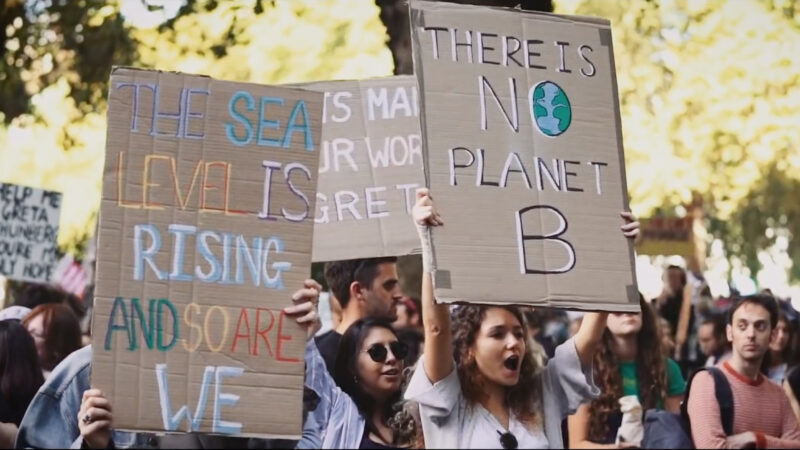
There is a golden opportunity for Labour and the Co-operative Party to present a vision that places Britain back at the centre of the global stage. This demands a level of sophistication that moulds domestic, international development and climate change policies.
Much is written about the importance of the party being proud of Britain and ambitious about what the country and its diverse people can achieve for the benefit of communities. I agree with this sentiment. Sadly, the country urgently needs fresh thinking on this objective, which has in recent months seen our current government embarrassed on the international stage as a result of chaotic infighting, a poor-performing economy and the bungling of Brexit.
The big opportunity, then, rests on Britain building a truly global ambition to help save the planet from climate change. To date, British governments have played an essential role (including progress made by New Labour), but there is room to present something much bolder than what is being offered by the current zombie administration. Labour is already doing this as shown by Shadow Chancellor Rachel Reeves’ commitment to a £28bn annual investment to tackle climate change. Here I set out why this is so fundamental.
First, we must start local. My work on policing and crime across the West Midlands has been incredibly informative and helped me to see that no person or organisation can achieve anything alone. Contrary to some of the old-school thinkers out there, crime cannot be tackled simply by arresting and imprisoning a person repeatedly. Narrow and one-dimensional solutions are expensive and ineffective.
When we look beyond the individual, we see the real answers come from true collaboration between communities, on housing, health, addiction support and employment services. These local-level principles provide lessons with international relevance. Radical worldwide solutions to climate change need this same co-operative thinking at the global and parliamentary level and in partnership with devolved governments and grassroots initiatives here in the UK and abroad.
Britain may be an island but, given the international ramifications of climate change, this will not draw a convenient protective bubble around us. Severe droughts, flooding and extreme weather risk a new era of mass displacement, refugee crises, starvation, fights over water and a trail of destruction, trauma and war. As a proud country that champions compassion and humanity, we have a moral duty to help prevent and tackle these crises. We also have plenty of self-interest in doing so for our own health, prosperity and security. Acknowledging this gloomy scenario – and doing so soon – gives us the opportunity to lead the world in stopping it happening. There is no time to waste.
Putting Britain in pole position to tackle global catastrophe should start at home. Existing workers and future generations alike have a huge stake in taking up the green industry jobs that we need to genuinely strive to become world leaders. This is where devolved and local government come in – helping connect, explain, inspire and direct people towards these new career opportunities. People need to understand what these jobs actually look like and why they should be excited about the agenda.
It also requires huge and ambitious investment in the research and development of green technology, through the leadership of a progressive and imaginative government. This will depend on an equally significant investment in the practical skills required to build, develop and evolve these technologies: more engineering, design and creativity training through apprenticeships, technical education and degrees, retraining for adults and multi-disciplinary green technology hubs across the country. Keir Starmer has already articulated key components of this ambition. In providing these opportunities for people from all walks of life – whether in ‘Red Wall’ seats, coastal towns or outer-city estates in big cities like Birmingham – this future-looking investment would give purpose, decent pay, pride and international esteem to a new era of green workers.
There is another profoundly important dimension to all of this. Do this right and at the right scale, and this could be an integral aspect of the country’s international development strategy – preventing new environmental crises and the resultant fallout for developing nations, providing energy security for the poorest countries and building thousands of green well-paying jobs to tackle the appalling poverty and destitution suffered by millions of people. This chimes strongly with the Labour leader’s commitment to reverse the merger of the Department for International Development and the Foreign Office. The Conservative government’s decision to merge these departments has been criticised as short-sighted and a derogation of our duty to tackle human suffering.
To be truly great in this century, Britain needs to step up further and help the earth defeat man-made disaster. We need to recognise how the UK connects to other nations and regions through a sophisticated joining of great domestic policy, global leadership and international development. And along with the accolade of being ‘great’, we will provide brilliant jobs at home, create prosperity and support billions of other human beings across the globe. The positive reverberations of this will impact us here in Britain for hundreds of years to come.




More from LabourList
Scottish Parliament elections 2026: Full list of Labour candidates for Holyrood
‘As metro mayors gain power, Labour must tighten political accountability’
Letters to the Editor – week ending 22 February 2026